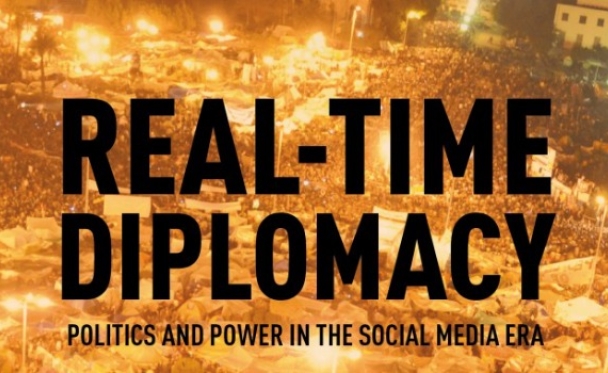
“Real-Time Diplomacy” Book Talk with CPD Director Philip Seib
The USC Center on Public Diplomacy was pleased to present a book talk with CPD Director, Philip Seib, on his recently published book, “Real-Time Diplomacy: Politics and Power in the Social Media Era.”
In the book "Real-Time Diplomacy", Seib tackles a vital question: How can any policymaker keep afloat in the flood of information coming from a vast number of sources? And, as the events of 2011 illustrate, power can emanate from the public, and so developing and maintaining ties with publics around the world is an essential element of foreign policy.
A conversation about the role of social media in crafting and implementing foreign policy and public diplomacy was presented. Seib offered insights into one of the most important challenges of the 21st century, by asking the question, How can policymakers shift away from being mere spectators and address the political realities of a social-media-oriented society?
SYNOPSIS
Twitter, Facebook, and other social media tools are reshaping the new diplomacy environment, impacting the way in which information is shared around the world. How do you do foreign policy in an era when Twitter is faster (and sometimes more accurate) than the CIA? This is a question CPD Director Philip Seib addresses in his new book, “Real-Time Diplomacy: Politics and Power in the Social Media Era.” On September 13, the USC Center on Public Diplomacy presented a book talk with Seib, who gave insight into the role of social media in crafting and implementing foreign policy.
In light of the recent protests in Libya and Egypt, Seib considered what would have happened 20 years ago if there was a rumor that a movie was made in America that portrayed the Prophet Mohammad. Before the era of internet and social media, it would simply be a rumor. However, YouTube has provided an outlet for the clips to spread around the world, reaching millions and igniting resentments.
The internet and social media allows every one of us to act as a journalist, having one way or another to get around government censorship and control. How are governments able to deal with this new reality of transparency? Seib highlighted that today’s social media-oriented society creates a bigger need for public diplomacy. With the public now expecting to be engaged by governments, public diplomacy is no longer an option, it is a necessity.
His talk concluded with two recommendations. One, internet education needs to train people to actively distinguish the bias of the source they are reading and determine what is credible. When asked how you go about teaching media literacy, Seib emphasized the need to start young, as early as second grade. Lastly, we ought not to overstate the role of media and become technological determinists. The media are tools, not something that can replace policies or the individuals committed to political action.
Visit CPD's Online Library
Explore CPD's vast online database featuring the latest books, articles, speeches and information on international organizations dedicated to public diplomacy.











